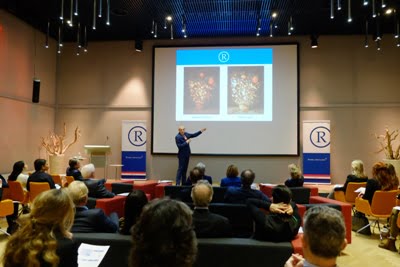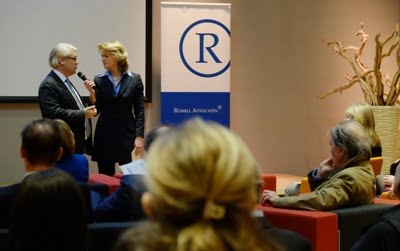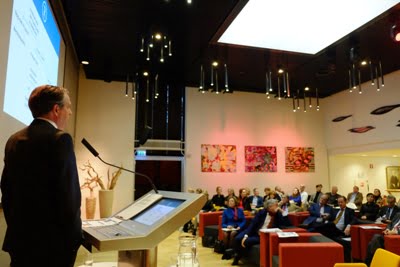Paul is a highly experienced, creative and tenacious litigator
paul.russell@russell.nl +31 20 301 55 55At the art & law symposium, Alexander Pechtold and Paul W.L. Russell, LL.M. discussed the list of protected cultural heritage in private ownership. Pechtold reassured art owners: the government will not go round and visit private collectors to see what’s on the wall, nor will art fairs be checked as to whether there are objects that should be placed on the list.
Russell Advocaten organised a very successful symposium on the evaluation of the Heritage Act on 27 November. The main speaker was Alexander Pechtold, Chairman of the Advisory Committee for the Protection of Cultural Property, former minister and former leader of D66 in the House of Representatives. The room was full of participants who were very involved in the subject and asked many questions about the practical consequences of the report of the Advisory Committee for the Protection of Cultural Property. Maria Henneman of Henneman Strategies moderated the symposium.
Paul W.L. Russell, LL.M. was the first to speak. He addressed the evolution of the Cultural Heritage Protection Act to the current Cultural Heritage Act. Placing objects on a list of cultural objects that are not allowed to leave the Netherlands is a major invasion in the right of ownership. It is therefore good that the Pechtold Committee has addressed the question of compensation. Hopefully, the National Acquisition Fund will be sufficiently filled. 50 million euros for 2020 seems to be a lot, but is little for indispensable masterpieces, as can be seen from the purchase of Marten and Oopjen. What does Alexander Pechtold think of this?
was the first to speak. He addressed the evolution of the Cultural Heritage Protection Act to the current Cultural Heritage Act. Placing objects on a list of cultural objects that are not allowed to leave the Netherlands is a major invasion in the right of ownership. It is therefore good that the Pechtold Committee has addressed the question of compensation. Hopefully, the National Acquisition Fund will be sufficiently filled. 50 million euros for 2020 seems to be a lot, but is little for indispensable masterpieces, as can be seen from the purchase of Marten and Oopjen. What does Alexander Pechtold think of this?
 PAN Amsterdam
PAN AmsterdamAfter this, the floor was given to Mark Grol, Managing Director of PAN Amsterdam. He was pleased to report that there had already been several large sales at the art fair and invited the guests of the symposium to visit this internationally renowned fair after the symposium.
 Then, there was an opportunity to put questions to Alexander Pechtold, the chairman of the Advisory Committee for the Protection of Cultural Property. He briefly explained that the Committee’s aim was to make policies for better dealing with privately owned cultural heritage, so that incidents can be prevented. E.g. the commotion about Princess Christina’s sale of a drawing by Rubens.
Then, there was an opportunity to put questions to Alexander Pechtold, the chairman of the Advisory Committee for the Protection of Cultural Property. He briefly explained that the Committee’s aim was to make policies for better dealing with privately owned cultural heritage, so that incidents can be prevented. E.g. the commotion about Princess Christina’s sale of a drawing by Rubens.
The questions mainly concerned the inventory of privately owned art. Will the government visit private collectors to see what they have? Alexander Pechtold said that the emphasis at present is on formulating new policies on what really needs to be preserved and on the evaluation the existing list. It is too much based on hobby and lobby. His own research had shown that in the meantime works on the list had disappeared or been destroyed and that in other works the attribution could not be correct.
In response to a question about delays in export licenses, Paul Russell pointed out that this was a consequence of increased customs control on transactions in the art trade. As from 10 January 2020, the 5th European Anti-Money Laundering Directive will be in force and seller and buyer will be screened in non-cash transactions from € 10.000.
Do you have any questions about the advice of the Pechtold Committee? Or do you need legal assistance in a matter concerning art? Please contact us:
The Advisory Committee for the Protection of Cultural Property (also referred to Pechtold Committee) presented its advice to the Minister of Culture on 30 September 2019. What are the consequences, among others for art dealers, collectors and foundations?
Minister Van Engelshoven has reacted to the report of Pechtold Committee. What does this mean for the art trade and private collectors?
The use of general terms and conditions is something companies can no longer do without. Contracting parties refer to their own general terms and conditions in small print, often containing favorable clauses for their own benefit. But what is the power of general terms and conditions? And what should be considered when using them?
In his interview on “Hidden Gems – Treasured artwork adds to allure of Netherlands”, Reinier Russell talks about how artworks still reflect the spirit of the Golden Age and where they can be found.
A new EU regulation requires anyone wishing to import cultural goods into the EU to have an import license or submit an importer’s declaration. When is which type of document required? How does it affect art dealers, galleries, auction houses and collectors, both inside and outside the EU?
An African mask that was sold for 150 euros fetched 4.2 million euros at an auction. Were the French sellers able to undo the sale? How would this case have ended in the Netherlands?